-
INSTITUTE
-
EVENTS
-
ASSISES
-
SEMINARS
Meeting with a PhD student
Maud Rivolier
from the University of Paris 1
Panthéon-Sorbonne
preparing a doctoral thesis
entitled: "Community of the workplace"
HANNA DĘBSKA - lawyer and sociologist. Doctorate in legal sciences "The Constitutional Court as an institution of symbolic power" she defended with honors at the Jagiellonian University. In 2015, she received the First Prize for it in the 50th Jubilee Competition "State and Law" for the best doctoral thesis in the field of law. In 2016, she was awarded the START Scholarship of the Foundation for Polish Science for outstanding young scientists at the beginning of their scientific career with documented research achievements, as well as the Ronald and Eileen Weiser Professional Development Award scholarship, thanks to which she studied at the University of Michigan, USA. In 2021, she defended her doctoral dissertation in sociological sciences entitled “Homo academicus iuridus. Origin and structure of the academic legal field in semi-peripheral conditions” at the Faculty of Sociology of the University of Warsaw.
MITCHELL ORENSTEIN
- Professor at the Institute of Central and Eastern European and Russian Studies at the University of Pennsylvania. Author, among others, of the book:
“Privatizing pensions”, Princeton 2008.
As prof. Mitchell Orenstein writes:
“In the pension area, the World Bank/USAID coalition has been by a coalition led by the International Labour Organization (ILO) and International Social Security Association (ISSA) (…). The success of transnational advocacy coalitions thus depends not only on their own resources, ideas, legitimacy, and organisational behaviour, but also on their relative standing. In the case of pension privatisation, it is quite clear that the World Bank-led coalition has enjoyed much greater access to resources than the ILO-led coalition.” (s. 69).
“Interestingly, the European Union largely stayed out of the pension reform debate, though it issued several communications in the late 1990s that gave a subtle green light to pension privatisation experiments in the Central and Eastern Europe and the rest of the EU.” (s. 72).
“Pension privatisation has been advocated by a transnational coalition that spread these reforms as part of well-organised campaign. This campaign began when members of neoliberal epistemic community took positions of power in leading state and transnational organisations and worked to formulate a coherent global agenda to guide their activity. Ultimately, the campaign for pension privatisation encompassed a variety of transnational actors working in cooperation and conflict, whose actions have been driven by their own ideas, resources, and international decisions that have changed over time.” (s. 72-73).
“(…) pension privatisation ideas has been developed by a transnational advocacy coalition of policy actors including Chilean reformers, U.S. economists, U.S. government agencies, and the World Bank and other multi-lateral international organisations. This powerful coalition issued its manifesto in 1994 and gained the full resources of the World Bank at that time. This campaign has been organized and coordinated among the main actors through various international conferences, donor meetings, and individual contacts. Through the efforts of the individual proposals actors and their cooperation, this coalition has advocated the transfer of pension privatisation policies to countries around the world.” (s. 80).
“Poland is a country where transnational policy actors played a large role in putting pension privatisation on the agenda. The World Bank - sponsored the activities of the Office of the Plenipotentiary for the Pension Reform and even released one of its leading pension reform officials, a Polish citizen, Michał Rutkowski, to head this office. The World Bank was deeply involved in all aspects of reform planning. The Bank and USAID were also critical in reform implementation, as Poland experienced severe administrative difficulties in its social security administration, ZUS.” (s. 149).
MAŁGORZATA JACYNO
- Polish professor, sociologist, works at the Institute of Sociology at the University of Warsaw. She deals with the sociology of culture. Main publications: “Illusions of everyday life. On Pierre Bourdieu's Sociological Theory", IFiS PAN Publishing House, Warsaw, 1997, "Culture of Individualism", 2007, PWN, Warsaw, "Sociological Guide to Warsaw" (ed.), Oficyna Naukowa, 2016, Warsaw, "Culture on the Periphery" (ed. M. Jacyno, T. Kukołowicz, M. Lewicki), National Science Center, 2018, Warsaw.
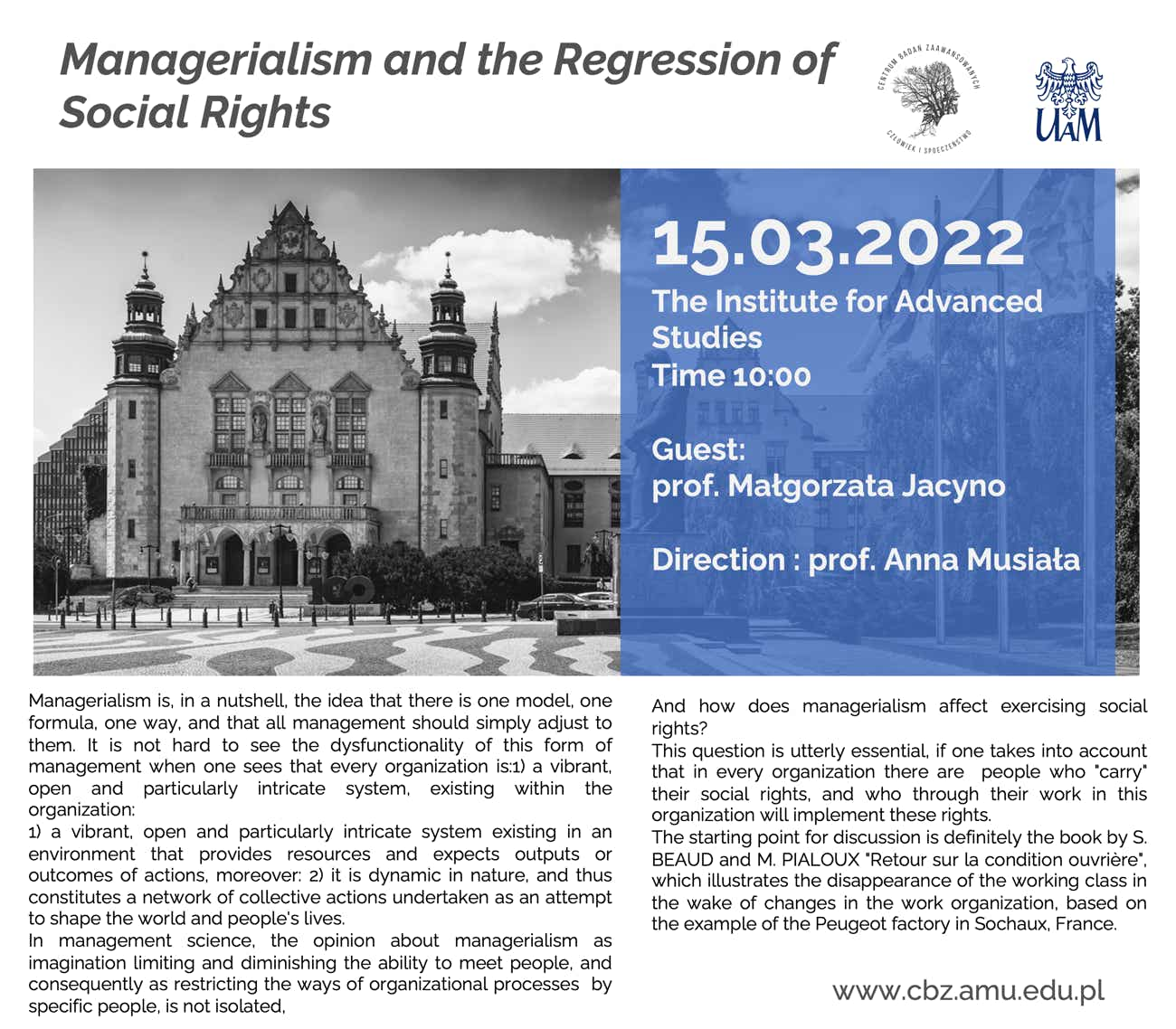
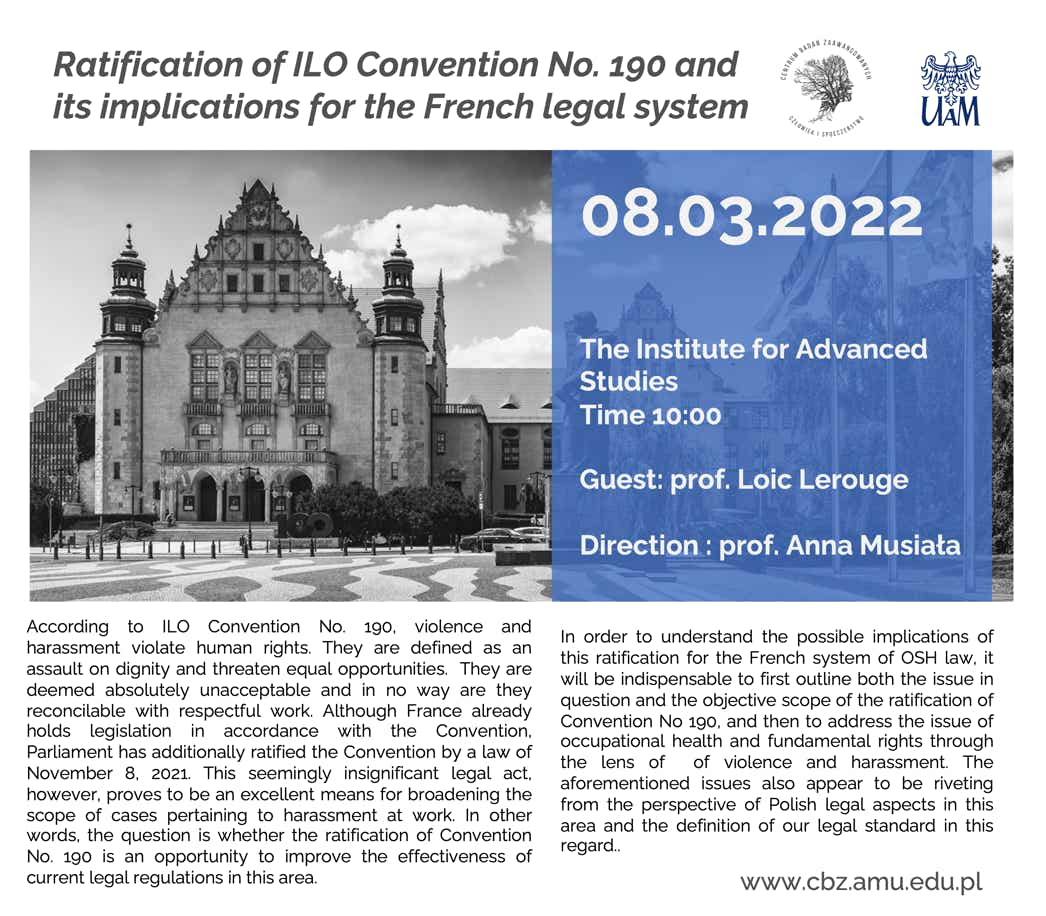
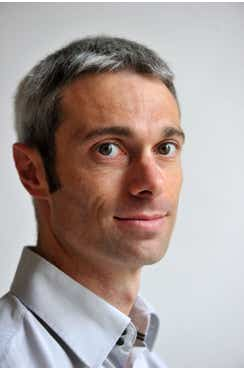
prof. Loic Lerouge
LOIC LEROUGE is a leading researcher in occupational medicine. His research consists of analyzing how the law relates to the issues of occupational medicine as part of a comparative approach to labor law and social security. To strengthen his research, it engages in dialogue with other disciplines and stakeholders. He is responsible for the topic "Mental and physical health of workers and individuals" at the Research Center for Comparative Labor Law and Social Security (COMPTRASEC UMR 5114, CNRS-University of Bordeaux). Author of numerous publications and conferences, in October 2021 he created the International Research Chair in Comparative Occupational Health Studies (CIECST) at the University of Bordeaux.
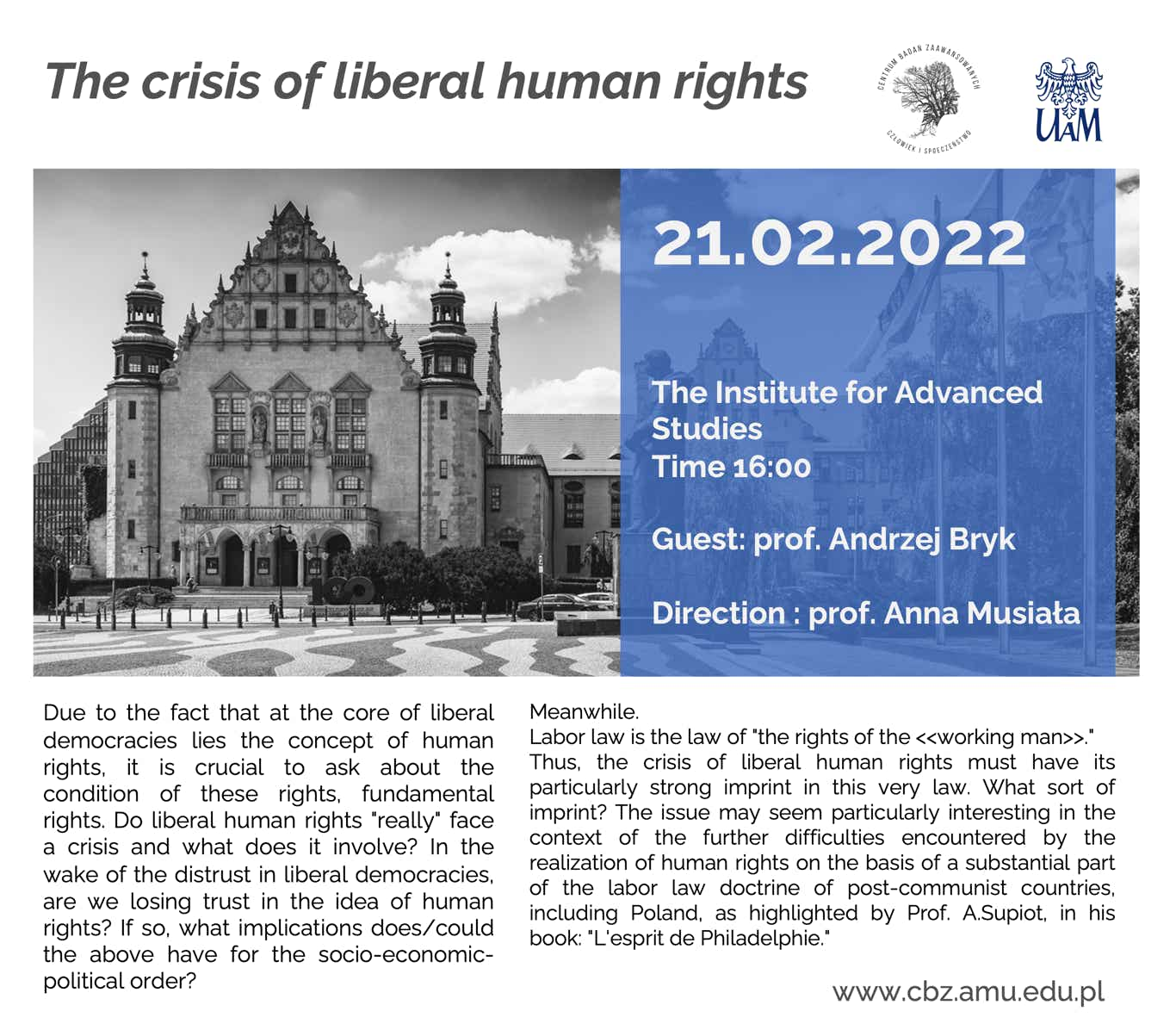
Prof. ANDRZEJ BRYK
- lecturer in the history of political systems at the Faculty of Law of the Jagiellonian University; lecturer at American universities, among others Harvard University, Amherst College, University of New Hampshire and Marquette University; author of publications on aspects of American constitutionalism, as well as political philosophy. Author, among others of a book: “Constitutionalism. From Ancient Israel to Liberal American Constitutionalism.”, 2013.
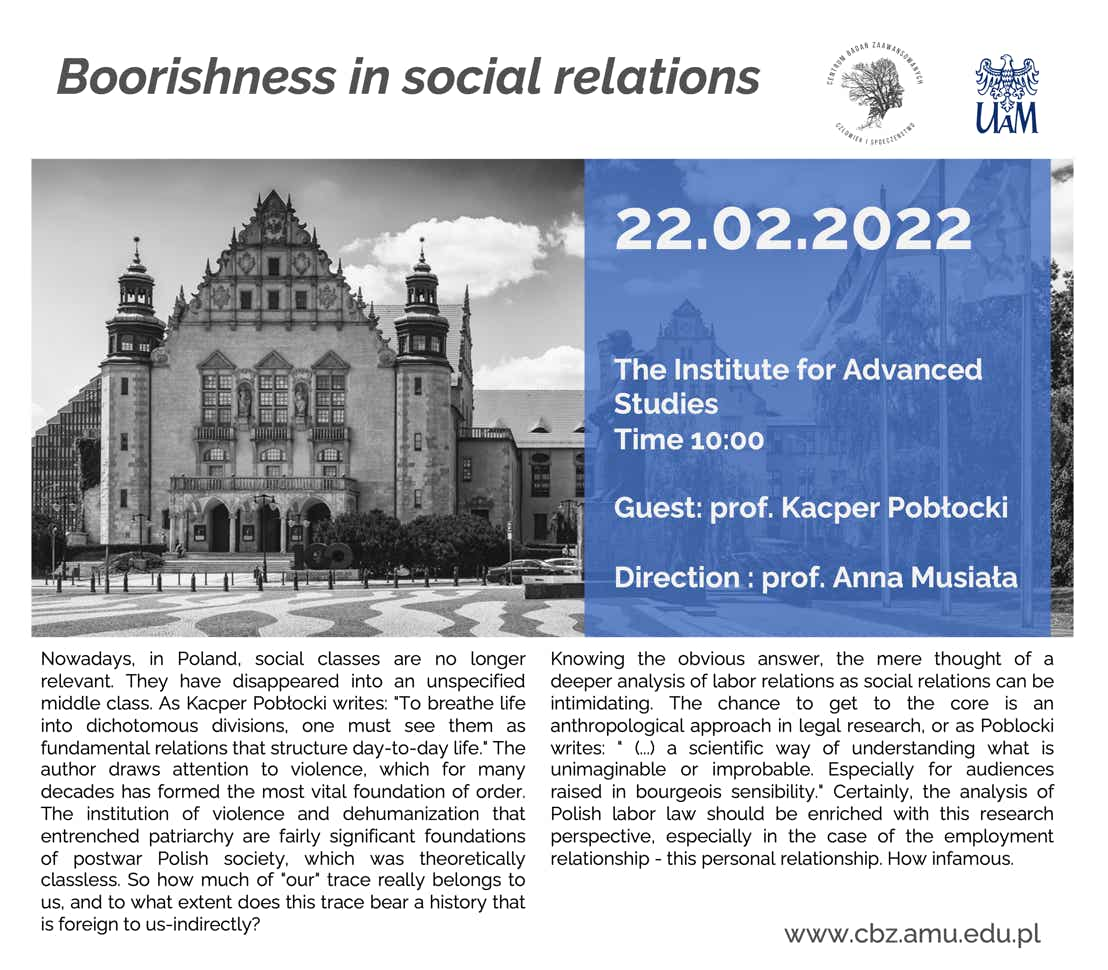
KACPER POBŁOCKI
- Post-doctoral degree,
social and historical anthropologist;
Author, among others, of books: “Capitalism. The Story of a Short Duration” (2017),
"Rude" (2021).
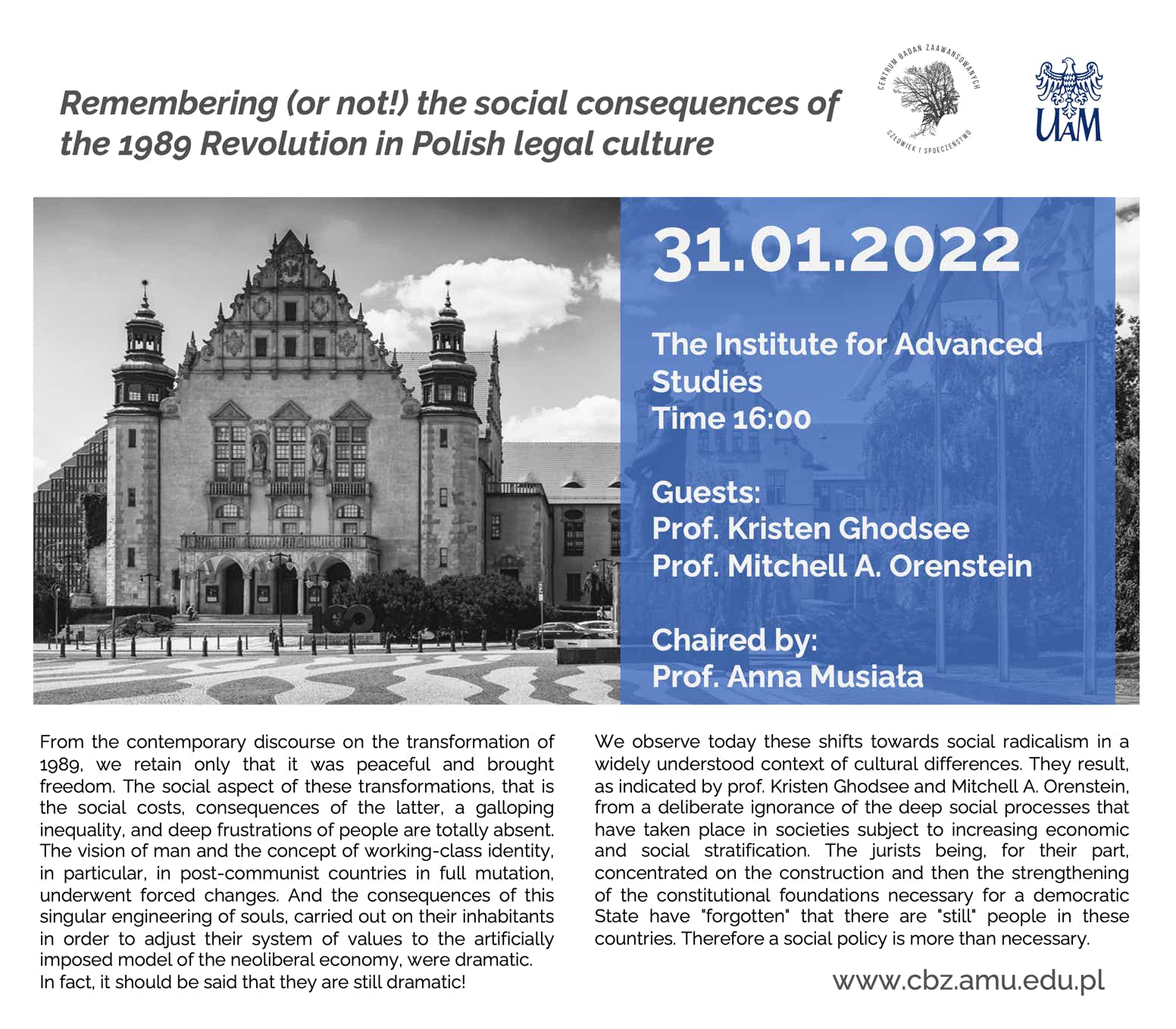
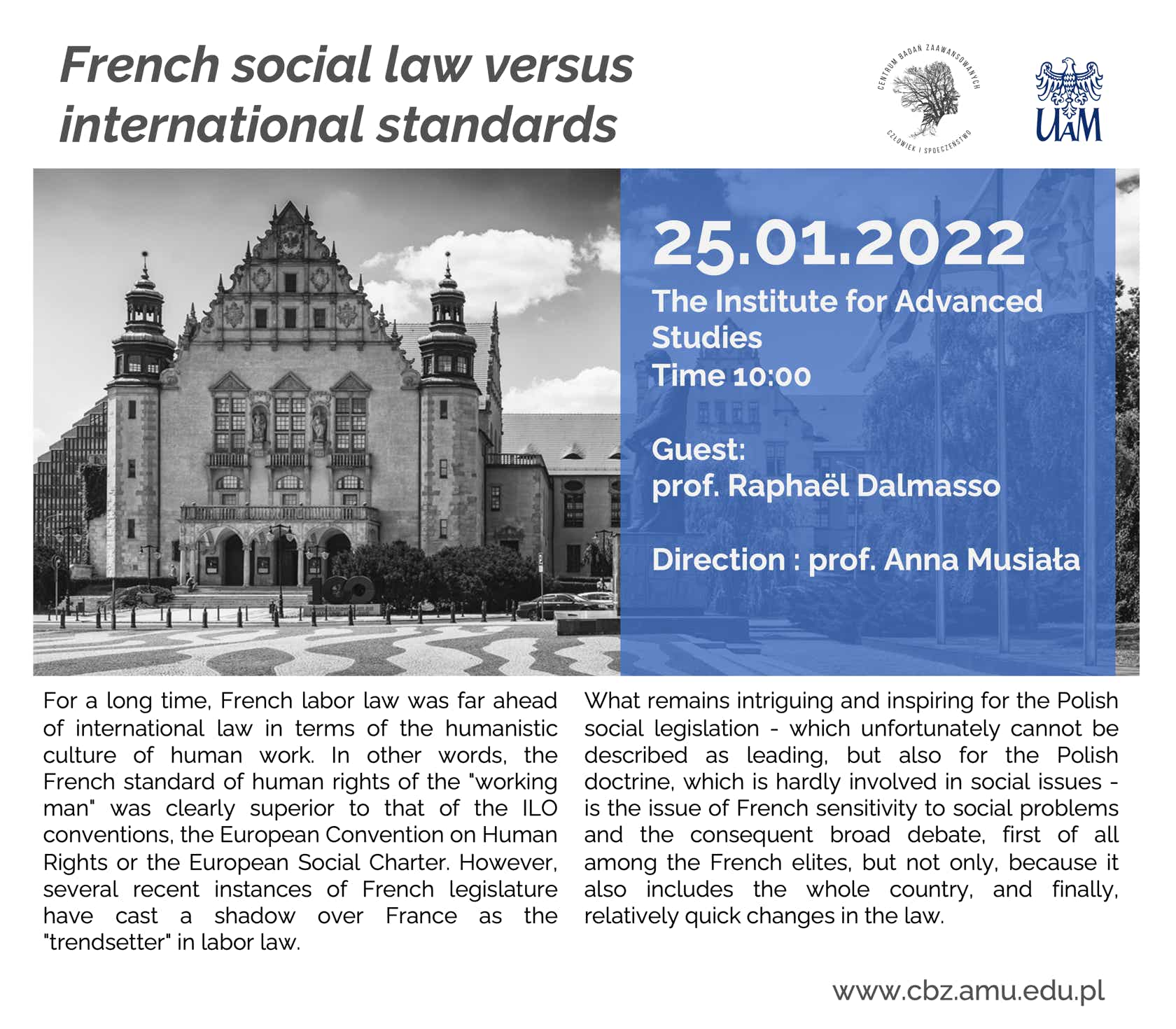
For a long time, French welfare law did not have to confront international labor law, whether the latter stemmed from ILO standards (ILO Conventions), the European Convention on Human Rights or even the European Social Charter.
Most often it was perceived as a more "advanced" and comprehensive law than these international sources. French welfare law has long been a model for a high legal culture in the field of social rights. However, those times are in a sense gone: France has recently been the subject of spectacular condemnations in various areas:
- forced labor and slavery (Siliadin case before the European Court of Human Rights);
- employment contracts (CNE) (against ILO);
- the amount of severance pay in connection with dismissal (against the European Committee of Social Rights).
In the first case, the ECtHR found that France did not provide "specific and effective" protection on its territory to victims of forced labor, servitude or slavery.
In the second case, in connection with the creation of a new employment contract (CNE) in French legislation in 2006, allowing for the dismissal of an employee without giving a reason during the first two years - international authorities considered the above to be contrary to the ILO Convention No. 158, which forced the French legislator to repeal the regulation in question.
In the third case, which is still pending, France has implemented a compensation scale for wrongful dismissal with maximum ceilings. Therefore, a dispute is currently pending before the European Committee of Social Rights. If French law is found to be contrary to Art. 24 of the European Social Charter, it will be one of the emblematic reforms in the term of President Emmanuel Macron that will be censored by international law.
We propose to return to these 3 cases that shook French law. It should be noted that the legislator's response to these international shortcomings was not identical: a genuine willingness to improve the positive Forced Labor Act, but much more resistance to the more political CNE cases and severance issues.
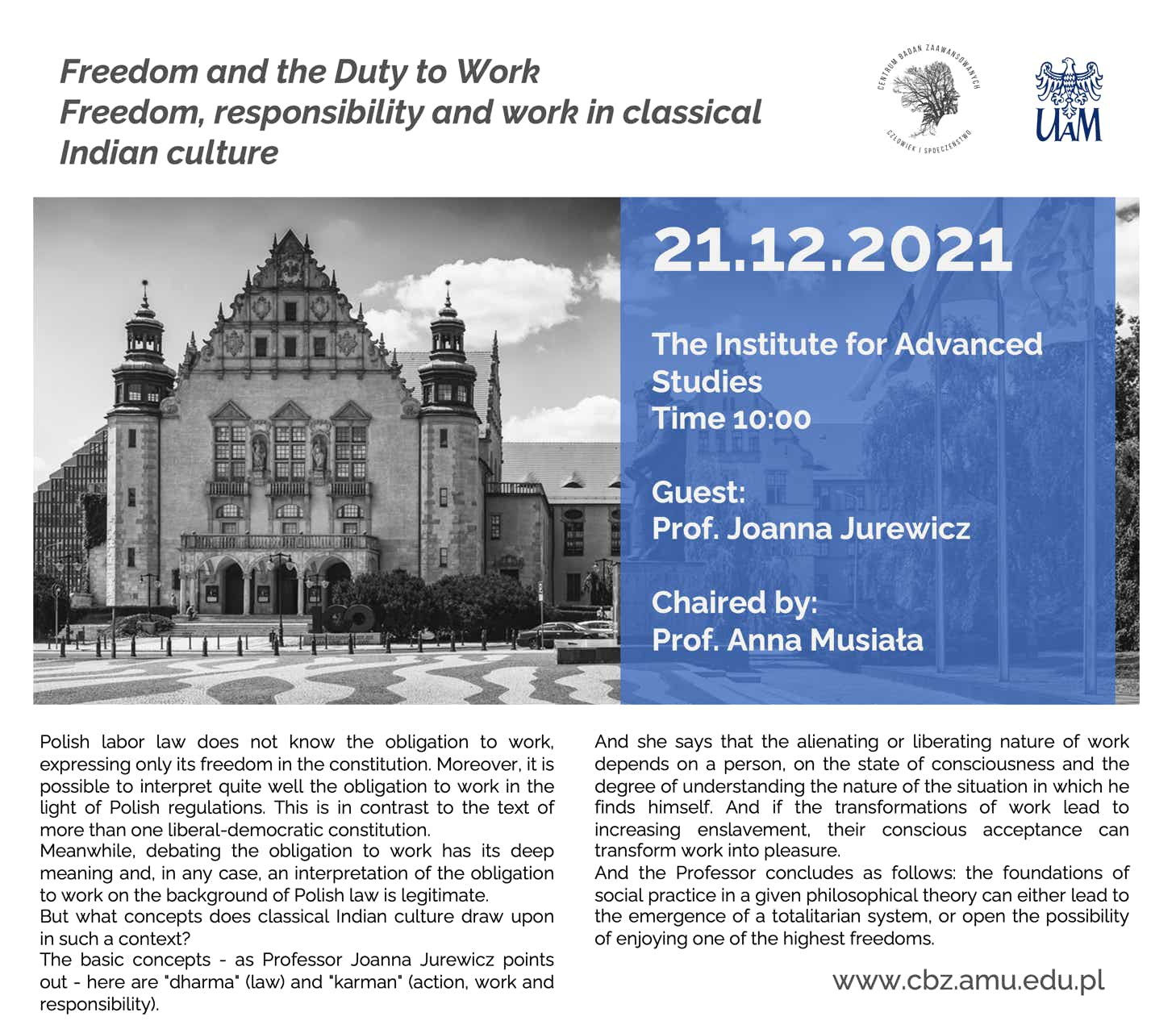
“Freedom, responsibility and work
in classical Indian thought"
- lecture presentation
Professor Joanna Jurewicz, from the meeting at CBZ.
CBZ, December 21, 2021.
Prof. dr. hab. Joanna Jurewicz – an Indolologist and cognitive linguist (Chair of South Asia, Faculty of Oriental Studies, University of Warsaw), as well as a translator, poet and writer. At the center of her interests lies the philosophical thought of Hinduism expressed in the oldest Indian literary monuments (texts of Revelation, epics, c. 13 BC to the turn of the era). She is particularly interested in the beginnings of abstract thinking, as well as the inheritance of concepts and images during cultural transmission. In her research, she uses an interdisciplinary methodology combining philology with cognitive linguistics. Author of five monographs (On the Names and Shapes of One. Monism of Indian Philosophy of Tradition 1995, Rigveda Cosmogony. Thought and Metaphor 2001, Fire and Cognition in the Rgveda 2010, Fire, Death and Philosophy. A History of Ancient Indian Thinking 2016, Invisible Fire. Memory , Tradition and the Self in Early Hindu Philosophy, 2021), translations of selected hymns of the Rigveda under the general title (Wędrówka za przestrzenią 2013, 2015, 2017) and over 80 scientific articles. Vice-president of the Polish Semiotic Society, member of Academia Europaea.
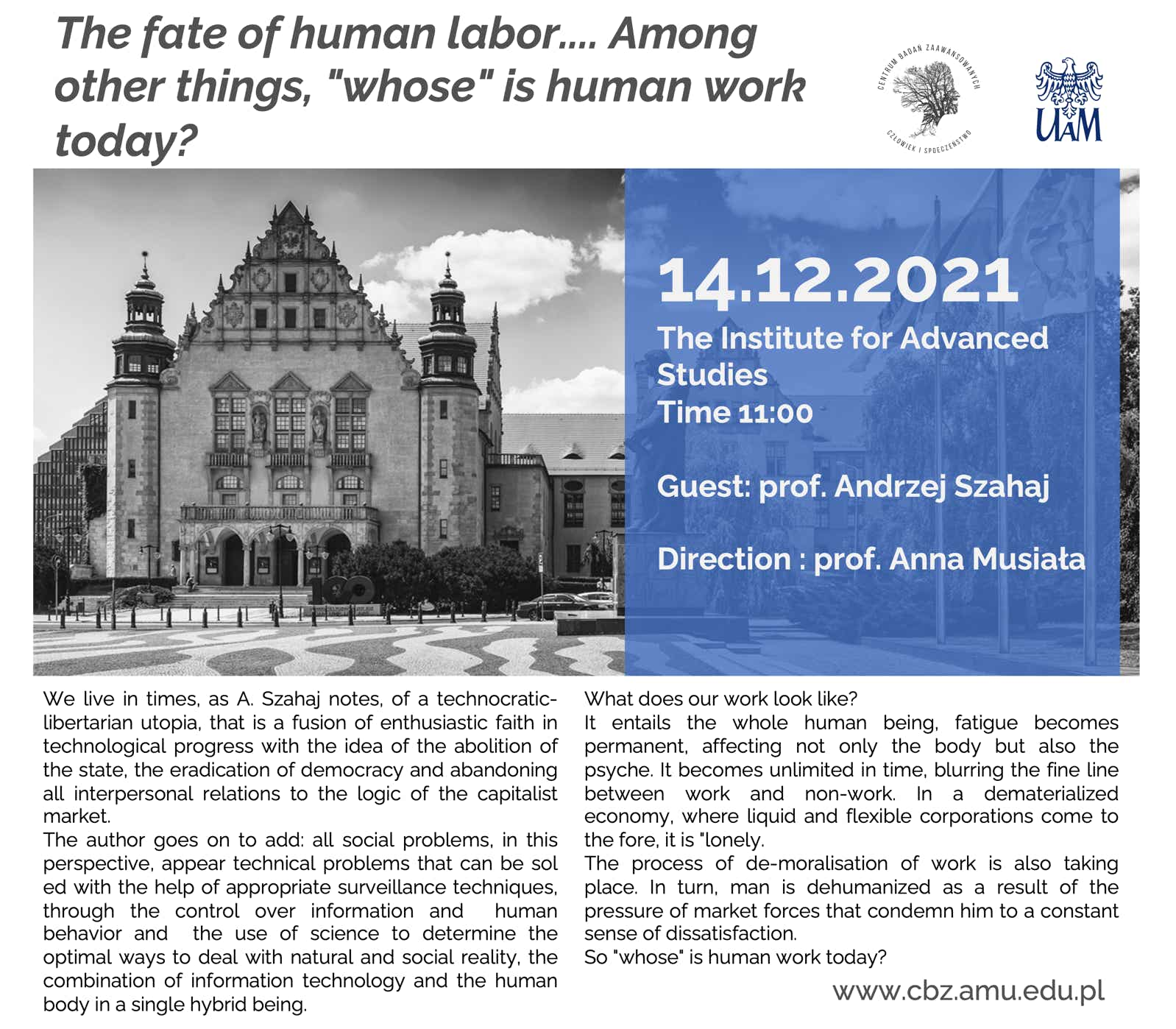
Andrzej Szahaj, prof. Post-doctoral degree, political philosopher, culture expert, professor at the Institute of Philosophy of the Nicolaus Copernicus University in Toruń. In the years 2008 - 2016, Dean of the Faculty of Humanities of the Nicolaus Copernicus University in Toruń; member of the Committee of Philosophical Sciences of the Polish Academy of Sciences, and earlier also of the Committee of Cultural Studies of the Polish Academy of Sciences. Author of books: Krytyka, emancypacja, dialog. Jürgen Habermas w poszukiwaniu nowego paradygmatu teorii krytycznej (Warsaw 1990), Ironia i miłość. Neopragmatyzm Richarda Rorty’ego w kontekście sporu o postmodernizm (Wrocław 1996), Jednostka czy wspólnota? Spór liberałów z komunitarystami a „sprawa polska” (Warsaw 2000 ), Zniewalająca moc kultury. Artykuły i szkice z filozofii kultury, poznania i polityki (Cracow 2004), E pluribus unum? Dylematy wielokulturowości i politycznej poprawności (Cracow 2004), Filozofia polityki (razem z Markiem N. Jakubowskim, Warsaw 2005), Teoria krytyczna szkoły frankfurckiej (Warsaw 2008), Relatywizm i fundamentalizm (oraz inne szkice z filozofii kultury i polityki) (Toruń 2008), O interpretacji (Cracow 2014), Kapitalizm drobnego druku (Warsaw 2014), Inny kapitalizm jest możliwy (Warsaw 2015), Neoliberalizm, turbokapitalizm, kryzys (Warsaw 2017); Kapitalizm wyczerpania? (Warsaw 2019); Ponowoczesność i postmodernizm dla średniozaawansowanych (Warsaw 2021). Intern at Oxford, Cambridge, Leeds, St. Andrews and the University of Virginia (Charlottesville), University of California (Berkeley), Stanford University, Bellagio Rockefeller Center (Bellagio), The Netherlands Institute for Advanced Sciences in the Humanities and Social Science (Wassenaar). Scholarship holder of the Fulbright, Mellon, Rockefeller, Kościuszko Foundations and the American Council of Learned Societies.
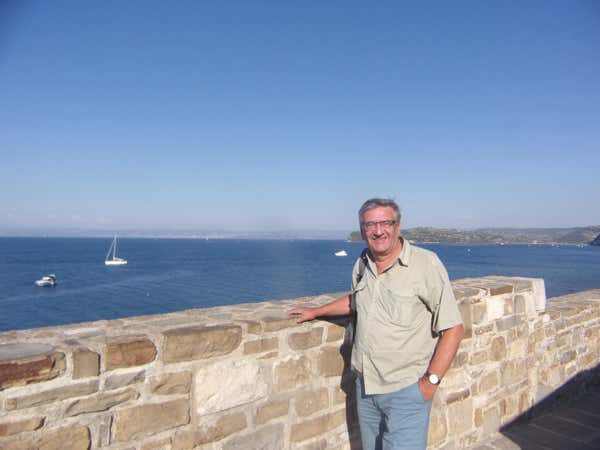
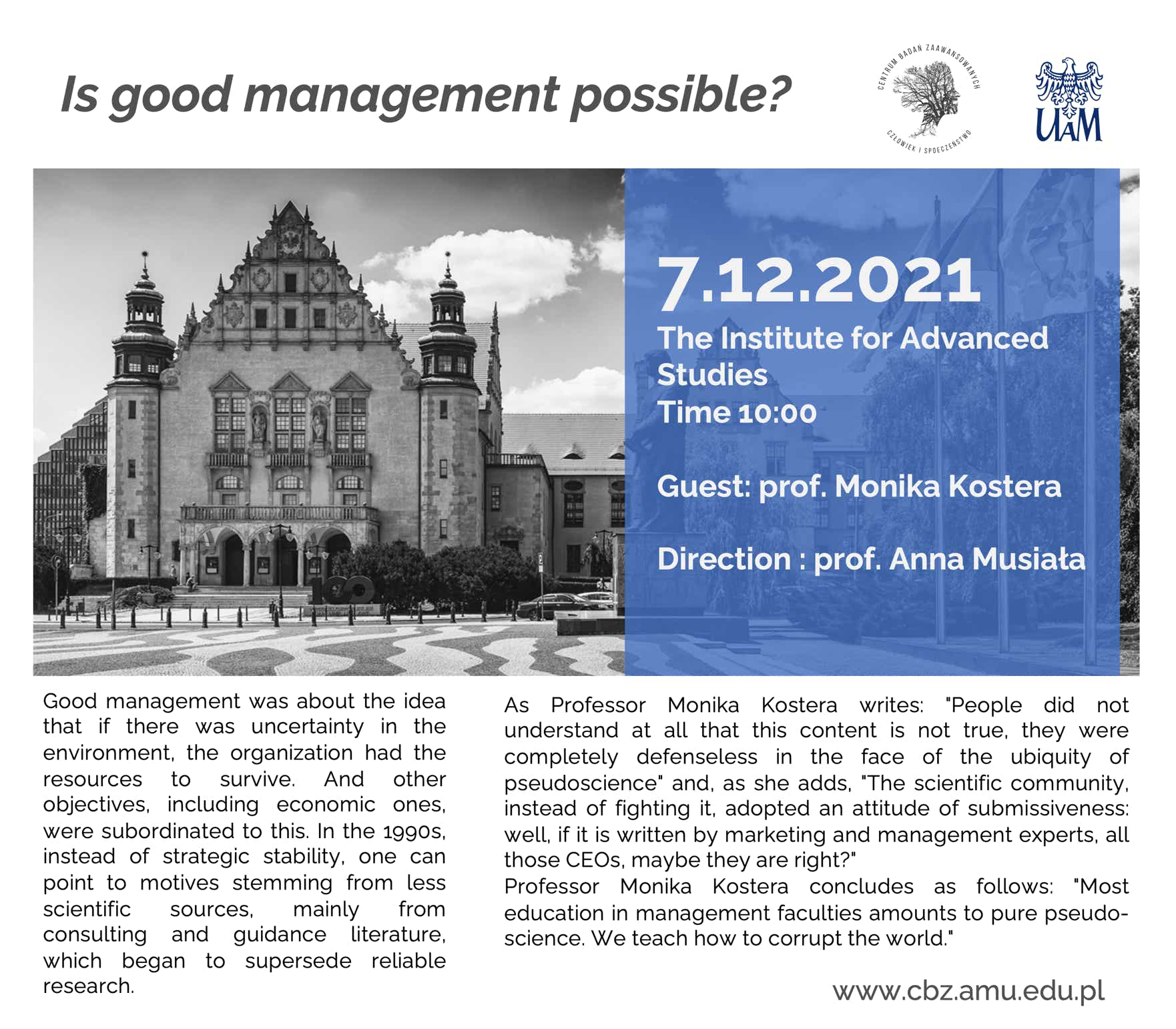
Pani Prof. Monika Kostera: Polish sociologist, titular professor in economic sciences (2004) and humanities (2017). She works as a full professor at the Faculty of Sociology at the University of Warsaw, as well as a professor at the Faculty of Social Sciences at the University of Södertörn in Sweden and the Institut Mines-Telecom Business School in France. She was also a full professor at Durham University in the UK. She has published over 40 books and a significant number of scientific articles devoted to the subject of organization and management. Her research interests include organizational imagination and disalienation of work. She also writes and publishes poetry in Polish, Swedish and English.
Source materials:
Monika Kostera: “Większość edukacji na wydziałach zarządzania to pseudonauka. Uczymy jak psuć świat”
Monika Kostera, Anna Musiała, Jarosław Niemiec: “Pracownik czy wolny najmita”
Anna Musiała: “Nie ma wolności w polskiej nauce prawa pracy”.
“Zarządzać po ludzku?” - to prezentacja wykładu
Pani Profesor Moniki Kostery, z dzisiejszego spotkania w CBZ.
CBZ, 7 grudnia 2021.
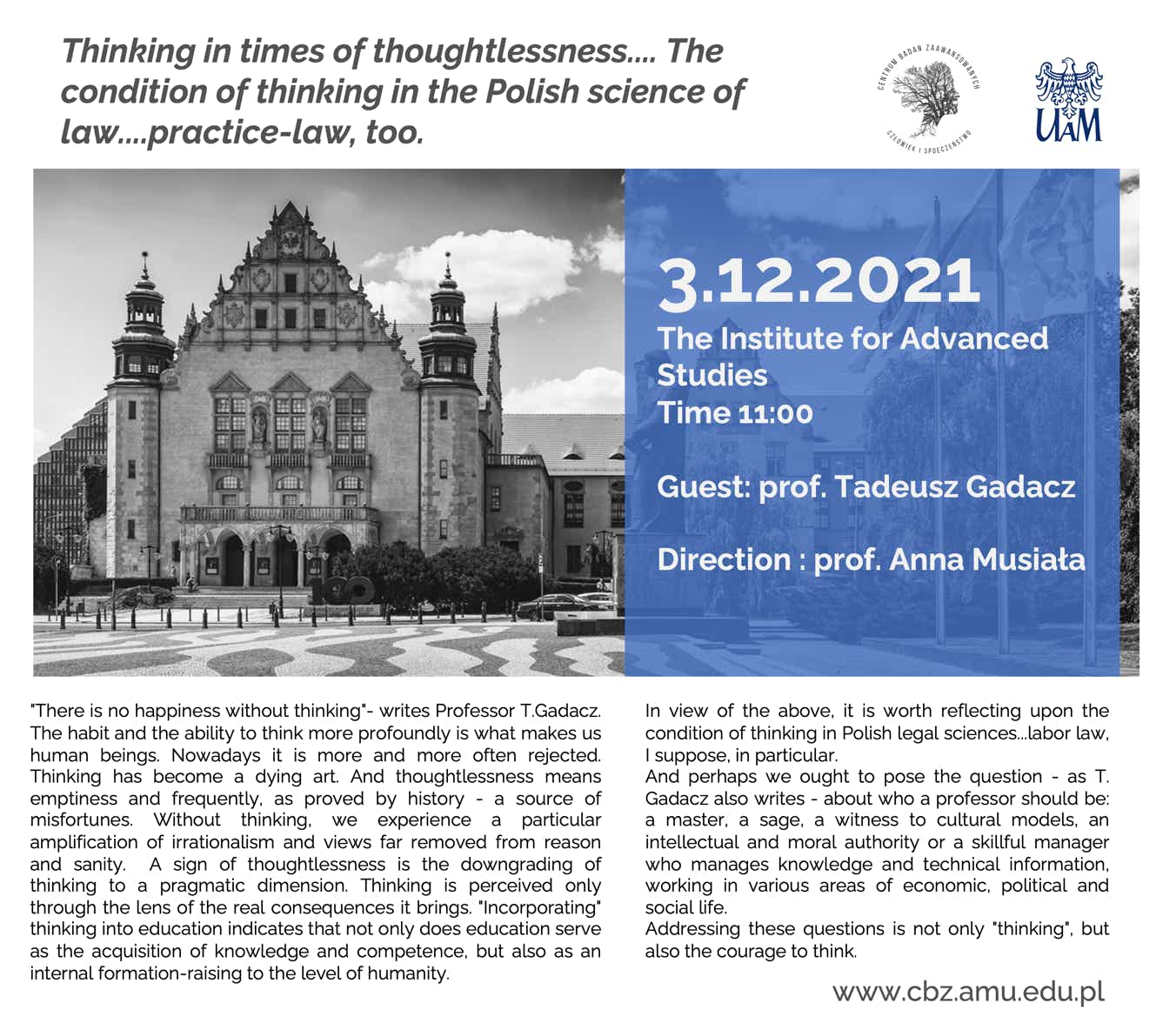
Ladies and Gentlemen,
very cordially
Professor Tadeusz Gadacz,
thank you for giving a fascinating lecture: "Thinking in times of thoughtlessness".
I also thank all participants
for attending a great meeting
Anna Musiała
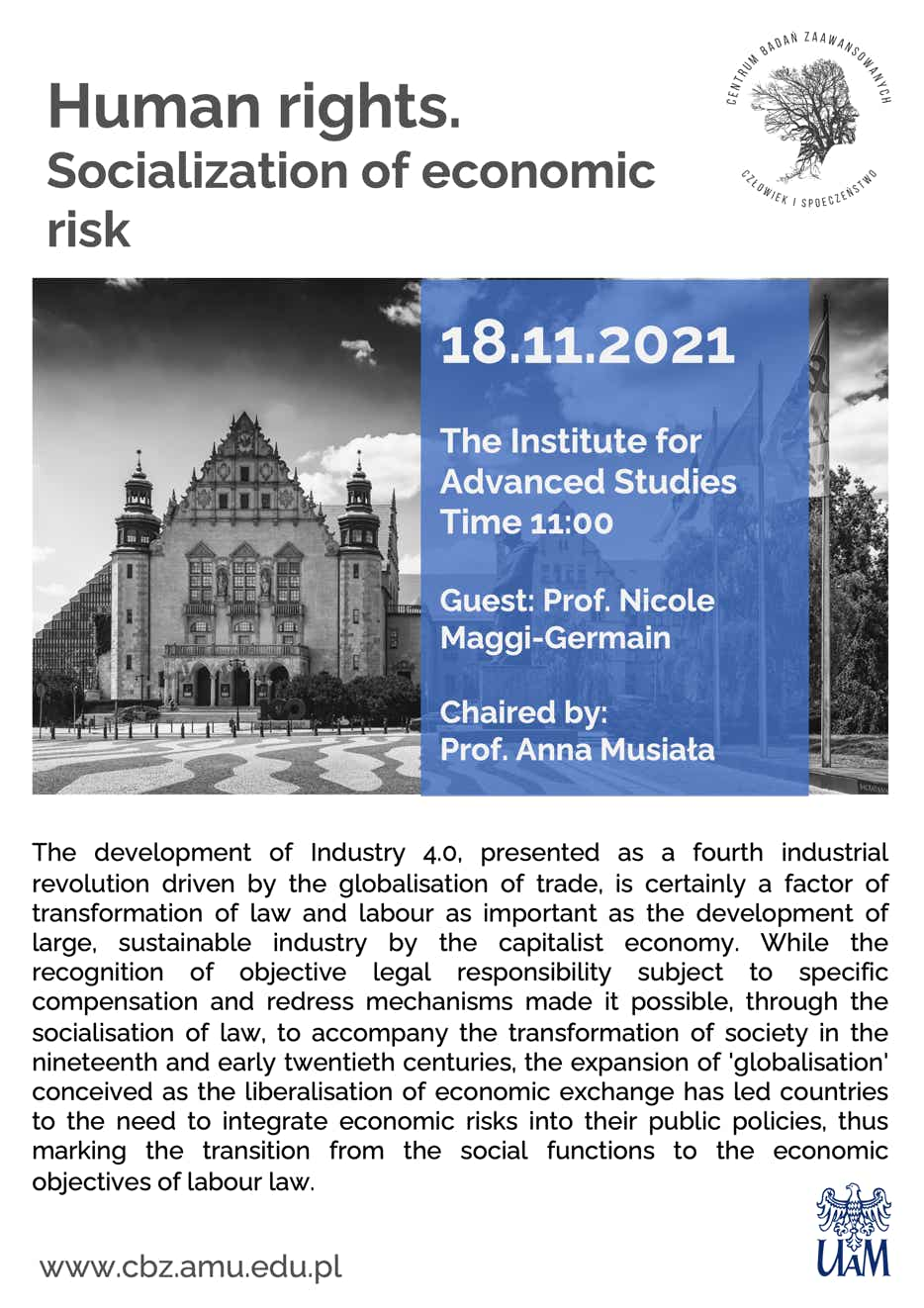
Ladies and Gentlemen,
On November 18, we welcomed at CBZ
Ms prof. Nicole Magii-Germain,
from University of Paris I (Pantheon-Sorbonne)
and we talked about
the human rights of the "working man".
Below there are the recorded lectures of
Prof. Nicole Maggi-Germain
Anna Musiala
Reference Material: Socialisation of Economic Risk and Redistribution of Responsabilities
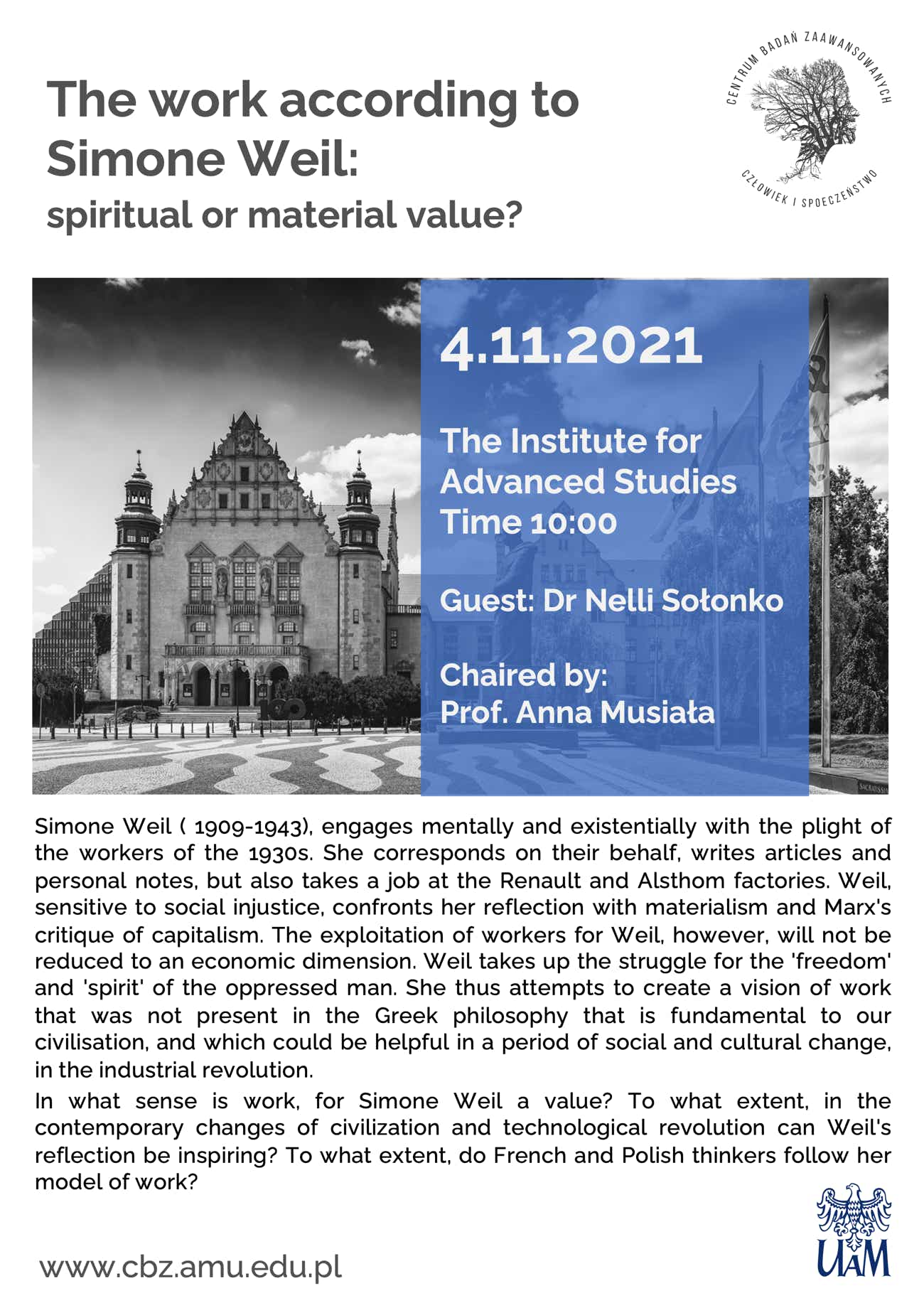
Ladies and Gentlemen,
on November 4, 2021 there was an exciting
seminar dedicated to
Unique Character,
Philosopher: Simone Weil and Her Perspective of Work.
Anna Musiała
La vraie définition de la science, c'est qu'elle est l’étude de la beauté du monde“.
„Prawdziwą definicją nauki jest stwierdzenie, że stanowi ona badanie piękna świata.”
Si la force est absolument souveraine, la justice est absolument irréelle. Mais elle ne l'est pas. Nous le savons expérimentalement. Elle est réelle au fond du coeur des hommes. La structure d'un coeur humain est une réalité parmi les réalités de cet univers, au même titre que la trajectoire d'un astre.
„Jeśli siła jest absolutnie suwerenna, niezależna, to sprawiedliwość jest absolutnie nierealna. Ale taka nie jest. Wiemy to z doświadczenia. Jest ona realna, prawdziwa w głębi ludzkiego serca. Struktura serca ludzkiego jest jedną z rzeczywistości wśród rzeczywistości tego wszechświata, w taki sam sposób jak trajektorie ciał niebieskich.”
« C'est par travail que la raison saisit le monde même, et s'empare de l'imagination folle».
„To dzięki pracy rozum jest w stanie pojąć sam świat i wykorzystać szaloną wyobraźnię.”
Simone Weil (1909-1943), a committed philosopher, came as a lightning through the dark years of the 20th century. She never separated thought from acquired experience or action. While working as a laborer, she lived in a working-class neighborhood and participated in the workers struggle. She condemned colonial ventures, served in the militia of the National Confederation of Labor and joined the resistance in London. She died in this city at the age of 34. In the midst of modern chaos, she has left behind a dazzling and visionary work, rejecting any form of ideological, religious or identity regimentation.
selection of quotations and translation: Anna Musiała
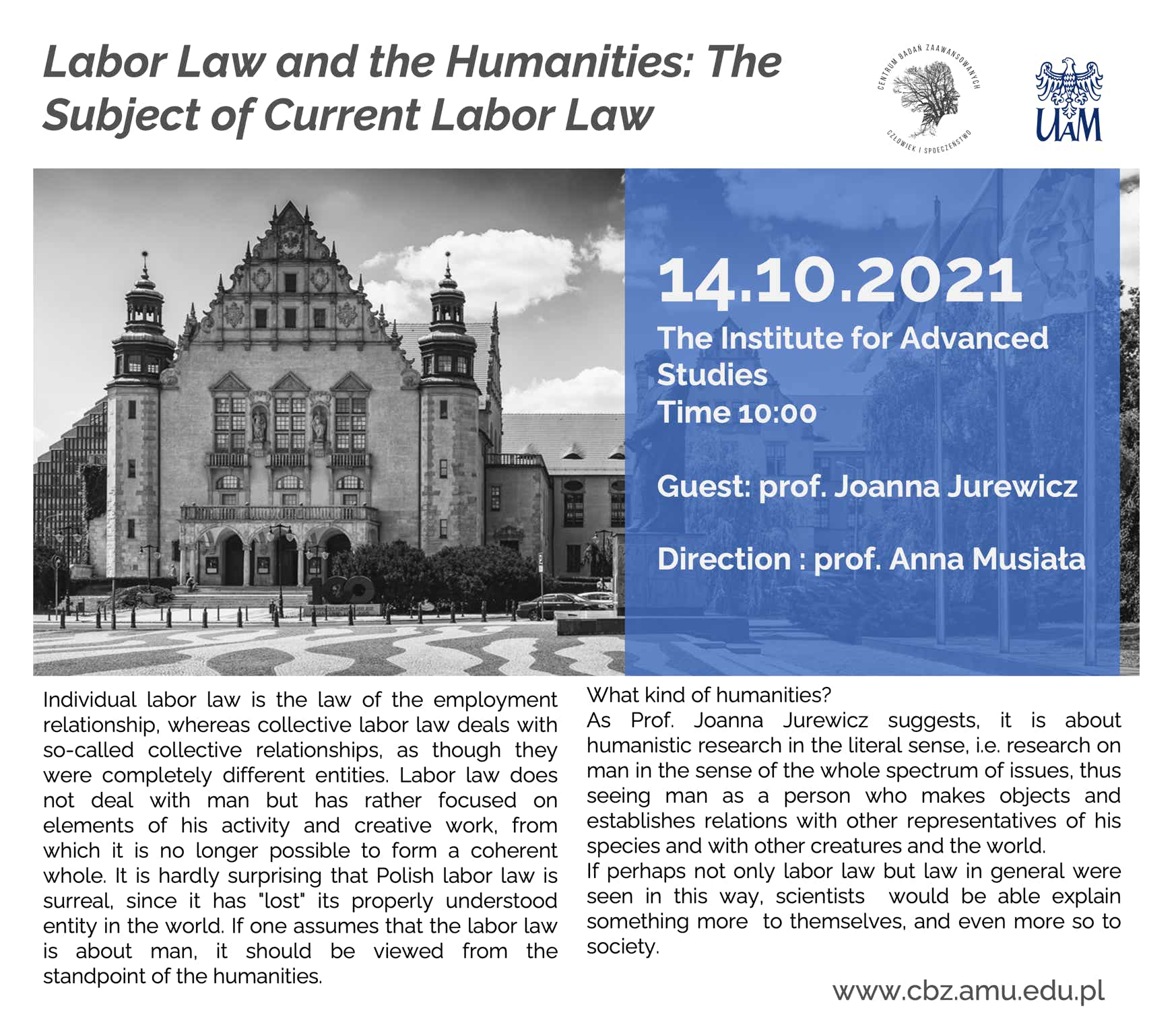
"Something is wrong with the world" - as Olga Tokarczuk said in her Nobel speech...
something is wrong with this law, and certainly with Polish labor law!
Our guest was
Professor Joanna Jurewicz, orientalist, cognitive linguist, author of the text:
"It's people who want others to understand them," published in GW.
Anna Musiała
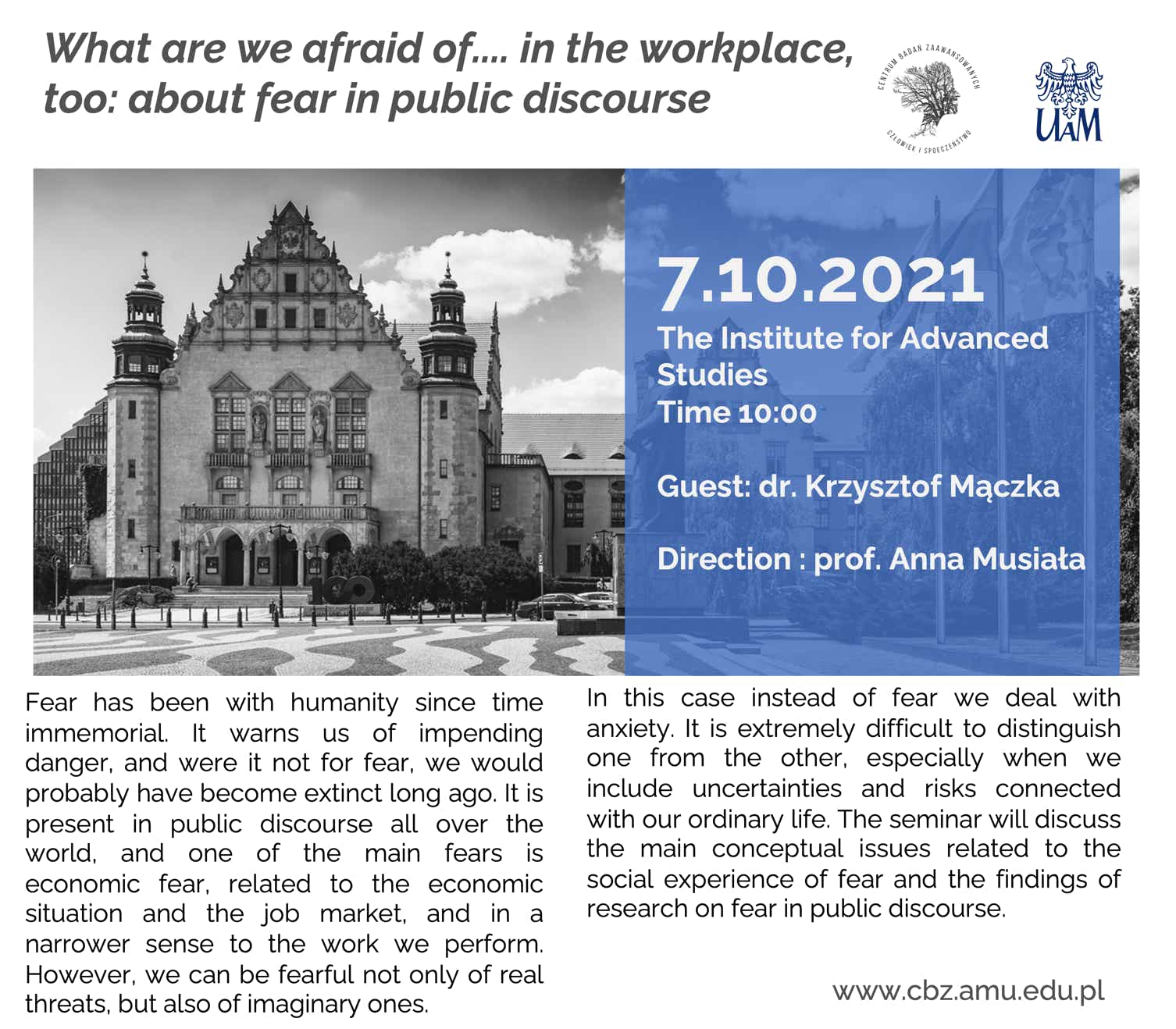
At the CBZ meeting on October 7, we discussed fear and anxiety, e.g.
in labor relations.
Our guest was Dr. Krzysztof Mączka, a sociologist from Adam Mickiewicz University
Anna Musiała